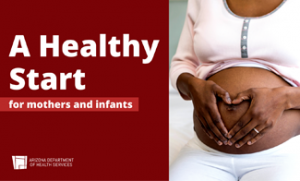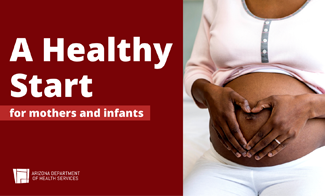 An ADHS program to educate pregnant and postpartum women about the benefits of prenatal care and childhood immunizations is resulting in healthier babies across Arizona.
An ADHS program to educate pregnant and postpartum women about the benefits of prenatal care and childhood immunizations is resulting in healthier babies across Arizona.
A comprehensive evaluation covering 2006-2016 found that participation in Arizona’s Health Start Program improved low birthweight and preterm birth outcomes, prenatal care attendance, and on-time child immunizations. The report, which included more than 7,200 births, is the largest in the U.S. of a community health worker program on incidence of birth weight, prenatal care utilization, and child immunization.
Developed in Arizona and offered for 28 years now, Health Start is a home visiting intervention that provides services through the child’s first two years. The program is provided free of charge and targets women in socioeconomic groups that have historically been underserved by programs that support maternal and child health, including Hispanic and American Indian women, those with less than a high school education, teenage and first-time mothers, and those with health risks such as diabetes and hypertension.
Low birth weight is associated with several interlocking socioecological risk factors, including poverty, discrimination, and access and quality of care, among others. Rates of low, very low (1,500 grams or 3.3 pounds) and extremely low birth weights (1,000 grams, or 2.2 pounds) in the U.S. consistently track with socioeconomic and ethno-racial health inequities. Babies who are very small at birth may have trouble eating, gaining weight, and fighting off infections. Some may have long-term health problems too. About one in 12 babies in the United States is born with low birth weight.
Health Start has made a significant improvement in infant health, according to the Health Start Program Evaluation Impact Report. That translates to about 244 fewer extremely low birth weight children and represents a potential savings of nearly $50 million.
The report found these other impacts:
- A reduction on babies with low birth weights, including a 38% reduction among American Indian mothers, and a 30% reduction among teen mothers. Low birth weight is considered less than 2,500 grams (5.5 pounds).
- An increase in prenatal care to improve the likelihood of a healthy birth for mother and child and reducing preterm births at less than 37 weeks of pregnancy.
- More childhood immunizations, an important factor in giving each child a healthy start.
Health Start uses Community Health Workers (CHWs) who often live in the same communities as the women they serve. By getting to know the women and their families, CHWs are better able to connect them to appropriate resources such as healthcare, education and parenting resources. CHWs educate parents about child development, immunizations, home safety, and vehicle safety. They also screen each child periodically to identify potential developmental delays and refer the family to the appropriate provider.
Researchers for the comprehensive study were: Dr. Samantha Sabo, associate professor, Northern Arizona University; Patrick Wightman, Center for Population Science and Discovery, University of Arizona; Kelly McCue, research coordinator for Northern Arizona University Center for Health Equity Research (CHER); Matthew Butler, Department of Economics, Brigham Young University; and Vern Pilling, Center for Biomedical Informatics and Biostatistics, University of Arizona.
Information on Health Start and other maternal and child health programming at ADHS is available on our website.










